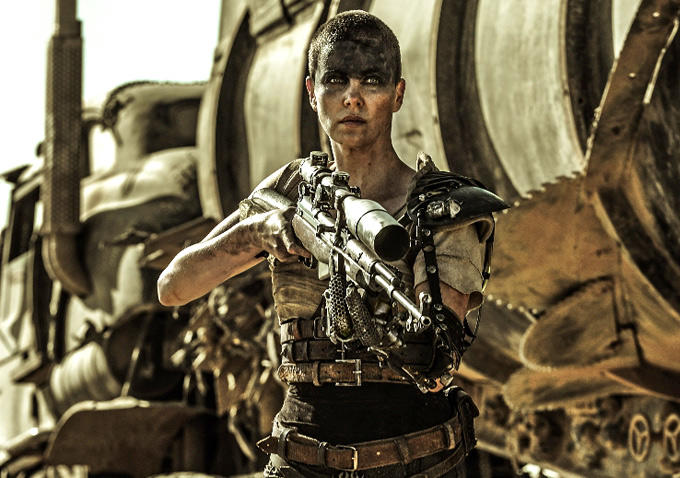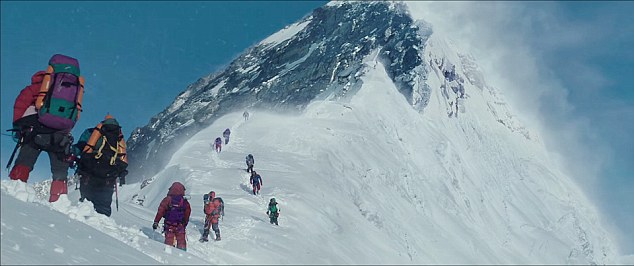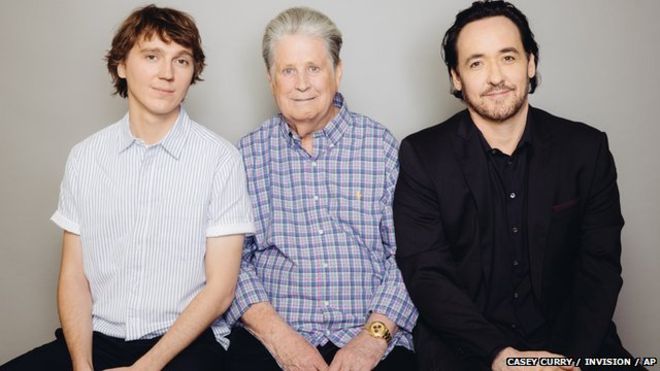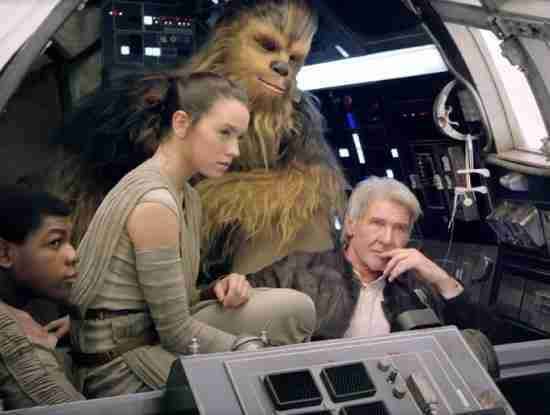Index
Spring
Spring brings blossoms even in the cinema, and in the spring of 2015 two big franchises unleashed their latest offerings: Mad Max: Fury Road and Jurassic World. Both looked spectacular on the big screen—if you're looking for popcorn-munchers, look no further—although Mad Max was more convincing. Stuck between those two was the fuzzy Disney exhortation for a brighter future, Tomorrowland, that didn't seem to convince anyone, least of all its cast. But first, About Elly, a 2009 film from Iran, finally gets an airing in the United States.About Elly (2009)
Sometimes my desire not to learn anything about a film before I see it can come back to bite me. This Iranian film was made in 2009, but it wasn't released in a cinema near me until 2015, which is why I'm including it here. Friends who wanted to see it mentioned that About Elly was from director Asghar Farhadi, who was responsible for 2011's A Separation. That was all I needed to know. A Separation is a brilliant, five-star film, one of the best films I've seen in the last few years. Thus, I went into About Elly thinking that it had been made after Farhadi had made A Separation, and thus I was puzzled—and disappointed—as to why it seemed to be a step backward for him. It was only afterward that I learned why: It actually predates A Separation.
Deception permeates About Elly, whose contrived premise is the pretext to examine reactions following a tragic event that involves Elly (Taraneh Alidoosti), a young woman persuaded to join a group of Iranian families on a seaside outing by Sepideh (Golshifteh Farahani)), who considers Elly a match for their recently divorced friend Ahmad (Shahab Hosseini). Producer-writer-director Asghar Farhadi opts for no musical score and for verité photography by Hossein Jafarian as he parses out details of his narrative, which takes too long to attract interest amidst the blur of characters framed by Jarafian's shaky camera work.
Ill-prepared for its trip, the group discovers that its original lodgings aren't available; the group is forced to bunk at a disused bungalow right on the beach, with Elly and Ahmad pretending to be newlyweds to avoid scrutiny. They soon develop an attraction even as Elly, the kindergarten teacher of Sepideh's daughter, remains enigmatic. Then one of the children Elly has been watching disappears in the surf, and although he is rescued, the group soon realizes that Elly has now gone missing. Fearing the worst, the group fumbles to contact Elly's family—including a brother (Saber Abar) who may be something else as Sepideh remains cagey about Elly's history.
Once About Elly settles into its narrative tension, its emotion begins to build, but by then Elly has departed, leaving scant trace of why we should care about her beyond the group's attempts to do the right thing—or at least appear to do so. Farahani gradually becomes the focal point—her Sepideh has the most substance—with Rana Azadivar and Merila Zarei portraying the other wives, and Mani Haghighi, Ahmad Mehranfar, and Peyman Moaadi portraying their husbands; Farhadi does capture a portrait of contemporary Iranian family dynamics with an intimate eye, an indication of the narrative incisiveness he would soon display, but his telegraphing familiar storytelling elements hampers About Elly.
Jurassic World (2015)
As disaster befalls the extremely wild-animal park Jurassic World, and dinosaur wrangler Owen Grady (Chris Pratt) warns, "Evacuate the island," the response from company flack Claire Dearing (Bryce Dallas Howard) is immediate: "We'll never reopen." Ah, business is business, and it's worse than dog-eat-dog. Tasked with continuing the Jurassic Park franchise, writers Rick Jaffa, Amanda Silver, Derek Connolly, and Colin Treverrow, who also directed, must balance franchise- and horror-film expectations while inserting not-so-subtle digs at corporate and military mindsets amidst the animatronic and computer-generated dinosaurs, the star attractions that dwarf the human characters in both scale and depth.
In fact, Jurassic World follows a reassuringly familiar template informed by executive producer Steven Spielberg's predispositions: Relaunching the dinosaur park to negative balance sheets, playboy mogul Simon Masrani (Irrfan Khan), to bolster attendance, authorizes creation of the genetically-fortified (and winkingly-named) Indominus rex, a super-duper predator that naturally defies containment and triggers the daisy chain of dino disasters that must be stopped by Owen and Claire, who is also absent-mindedly minding nephews Zach (Nick Robinson) and Gray (Ty Simpkins), who naturally roll into trouble when they wriggle free of adult supervision. Meanwhile, InGen security leader Vic Hoskins (Vincent D'Onofrio), initially interested in Owen's velociraptors as weapons of war, turns his sights on I. rex, apparently not heeding the lessons of the Alien franchise.
Aided by veteran cinematographer John Schwartzman, fledgling director Treverrow (who showed promise with the 2012 indie sci-fi rom-com Safety Not Guaranteed) displays a visual grandeur despite a few dubious realizations, but, ultimately, it's a matter of pointing the camera at the pervasive special effects, all underscored by sycophantic composer Michael Giacchino, slavishly channeling the master of manufactured emotion, John Williams. Howard and Pratt attempt chemistry although it's not their fault that everyone's character is in stereotyped shorthand; even consummate performer D'Onofrio dutifully ticks off his narrative expectations. Granted, Jurassic World is about the big, brutal beasties—and how quickly we can become jaded by them—but with scientist Henry Wu (B.D. Wong) skulking off with precious embryos, this franchise is hardly extinct.
Mad Max: Fury Road (2015)
Director George Miller might not know how to tell a good story, but he knows how to make a good film. In fact, Mad Max: Fury Road, the fourth installment of the post-apocalyptic saga featuring grim, revenge-minded former cop Max Rockatansky (Tom Hardy), uses a simple, elemental tale as the framework for the nearly non-stop parade of stunts and effects that compose this visual feast, although its raw, brutal, desolate atmosphere disguises the narrative simplicity, which pares backstory to an absolute minimum as it tosses the characters into the hungry maw of the kinetic, often-frenetic action.
Captured by the tyrannical warlord Immortan Joe (Hugh Keays-Byrne), Max is made an unwilling blood donor for mutant warrior Nux (Nicholas Hoult). Suitably enslaved, he is hauled out for Immortan Joe's epic chase after Imperator Furiosa (Charlize Theron), who is sent on a mission to collect fuel from Gas Town; however, that mission goes awry when she lights out for "the Green Place" instead while absconding with Immortan Joe's five nubile wives, one of whom is carrying Immortan Joe's child. Miller and co-writers Brendan McCarthy and Nico Lathouris don't even pause for exposition until the mid-point of Mad Max: Fury Road, and by then Miller's sweeping vistas, captured by veteran cinematographer John Seale's lush photography, have created an enveloping mood that reduces the narrative to crude, sometimes sadomasochistic basics.

Charlize Theron is at the front and center of the non-stop action in Mad Max: Fury Road, director George Miller's latest post-apocalyptic saga.
The real stars of Mad Max: Fury Road seem to be the plethora of fantastical desert vehicles, from motorcycles to muscle cars to tractor-trailers, plausibly built and embellished in a world of scavenging and scarcity; they careen and collide and explode in lieu of civil exchanges as Junkie XL's symphonic score veers between gravitas and portentousness. Hardy is largely a water carrier until the final third while Theron's Furiosa quietly but firmly inhabits the narrative's practically monosyllabic center; Theron is the glue that holds your interest. Mad Max: Fury Road looks spectacular, with the night scenes particularly evocative, a tribute to Miller's artistic eye that gives this sweeping, sprawling thriller its feral excitement, but, crucially, this dystopian discourse lacks emotional involvement.
Tomorrowland (2015)
The future is what you make of it—but you better make something of it, for better or for worse. That's the heavy-handed message Tomorrowland fumbles to convey, first with a fitful chase to locate one keynote character carried out by another keynote character, then with strident speechifying at the climax led by their mutual antagonist. Granted, Tomorrowland is a Disney live-action science-fiction fable that makes no secret of its family-friendly approach as it tries to disguise its clunky script, by Damon Lindelof and director Brad Bird, and underwhelming performances with a constant injection of bravura special effects accented by Michael Giacchino's ubiquitous, solicitous score.
Young Frank Walker (Thomas Robinson) arrives at the 1964 World's Fair with his homemade, faulty jetpack fashioned from a vacuum cleaner; he's hoping to help jump-start the future, but while haughty David Nix (Hugh Laurie) nixes Frank's hopes, young Athena (Raffey Cassidy) encourages him, giving Frank a glimpse of Tomorrowland, a futuristic Mecca for dreamers and visionaries. Years later, Athena, who still appears to be an adolescent, discovers Casey Newton (Britt Robertson), an optimistic teenager with boundless engagement; Athena gives Casey a glimpse of Tomorrowland that whets Casey's curiosity and spurs Tomorrowland into its familiar paradigm: Chased by malevolent robots, Casey seeks out now-middle-aged Frank (George Clooney); they bicker, then band together to learn the shocking secret of Nix's crumbling Tomorrowland.
Hampered by a narrative evenly split between halting and hackneyed, Bird lurches from one flurry of activity to another, occasionally flashing a visual flair but ultimately succumbing to action-film convention. Tasked with carrying the first half, Robertson appears plucky but fails to make a favorable impression; Clooney bolsters the proceedings when he arrives, but he and Laurie can only project against a tired, familiar background. Bird and Lindelof labor to make a social statement both passionate and inspirational, but they wallow in Disneyesque platitudes as Tomorrowland sputters with overactive incoherence while evincing little hope about its future.
Summer
If it's summer, it has to be the Beach Boys even if only your grandparents will care to listen to them any longer, although Love & Mercy, a distinctive biopic about Beach Boys' guiding light Brian Wilson, is worth heeding. The blockbuster from this "season" goes toward the other temperature extreme as Everest tries to climb the heights of suspense with its tragic true tale. More real-life individuals had their stories splashed across the big screen: Travel writer Bill Bryson takes A Walk in the Woods that is amusing if incomplete, while Boston gangster Whitey Bulger gets a chilling rendering by Johnny Depp but not much else to recommend Black Mass. Finally, and recalling your grandparents again, The Man from U.N.C.L.E. makes a game stab at a Sixties spy spoof that fell off the radar . . . until now.Black Mass (2015)
Although Johnny Depp's compelling portrayal of Boston Irish mobster Jimmy "Whitey" Bulger is quietly terrifying, Black Mass lacks the narrative cohesion to give Bulger's infamous deeds sufficient impact as director Scott Cooper's biopic borrows a few too many stylistic cues from Martin Scorsese. Bulger's sensational tale deserves cinematic exposure—coerced into becoming a Federal Bureau of Investigation informant, Bulger used that cover to escalate his criminal activities before becoming a highly sought-after fugitive—but Black Mass emphasizes action and atmosphere over storytelling clarity and thus loses its punch, squandering Depp's performance and a few key supporting ones in the process.
Basing their script on Dick Lehr and Gerard O'Neill's true-life Boston Globe account, Jez Butterworth and Mark Mallouk force viewers to infer contexts and relationships with their allusive, elliptical plotting that instead highlights personalities such as Bulger's and John Connolly's (Joel Edgerton). Connolly was the cocky FBI agent, once a childhood friend of Bulger, who successfully recruited Bulger to combat Italian organized crime in Boston; this enabled Bulger's Winter Hill Gang, buttressed by key subordinates Stephen Flemmi (Rory Cochrane) and Kevin Weeks (Jesse Plemons), to foment gambling, arms- and drug trafficking, and murder with the FBI's largely unwitting sanction until Connolly's new boss Fred Wyshak (Corey Stoll) demands accountability.
Depicting Bulger as cautious, collected, yet coldly ruthless, Depp keeps attention riveted on him, particularly when he menaces Connolly's partner John Morris (David Harbour) and especially Connolly's wife Marianne (Julianne Nicholson) in this crime drama's most compelling scene, although Depp occasionally recalls Jack Nicholson in The Departed, which incorporated a Bulger-like villain and thus reinforces Black Mass's derivative approach; similarly, Depp's exchange with Harbour may remind viewers of Joe Pesci's "I make you laugh? I'm here to fucking amuse you?" colloquy with Ray Liotta in Goodfellas. Ultimately, Cooper delivers a series of vignettes—violent yet often telegraphed, such as Bulger's killing of a potential witness against him that you can see coming for miles—that suggests Bulger's sordid saga without illuminating it even as cinematographer Masanobu Takayanagi's subdued color palette imbues Black Mass with a period feel. Kevin Bacon, Benedict Cumberbatch, and Dakota Johnson provide varying degrees of support behind Depp, but Black Mass fails to cohere convincingly despite it.
Everest (2015)
The May 1996 Mount Everest disaster that killed eight mountaineers was not only the worst single-day tragedy to date, it underscored both the increasing commercialization surrounding the ascent of the world's highest mountain and the danger posed by inexperienced climbers. At least that is according to mountaineer-journalist Jon Krakauer (Michael Kelly), who survived the disaster and wrote his account of it as Into Thin Air. Director Baltasar Kormákur's Everest recounts the events in bold, vibrant strokes while paring the narrative, credited to Simon Beaufoy and William Nicholson, to its essence, which leaves most of the participants sketched in as victims of fatal circumstance and Krakauer's conclusions mere suggestions.
However, two figures do gain dimension through peeks into their home life: cocky Texan Beck Weathers (Josh Brolin), whose family doesn't even realize at first that he is at Everest, and especially diligent Rob Hall (Jason Clarke), who leaves pregnant wife Jan Arnold (Keira Knightley) in New Zealand to guide Weathers, Krakauer, and other climbers up Everest. Hall's company, Adventure Consultants, operates on a tight budget not helped by competition from Scott Fischer's (Jake Gyllenhaal) more gonzo-oriented outfit that, along with other companies, are guiding their own groups of climbers; this swell of climbers creates a logjam near the summit, which exacerbates the many dangers of big-league mountain climbing including perilous altitude sickness in the "death zone" of Everest's upper reaches, and the deadly blizzard that suddenly engulfs the now-crowded peak.

Everest doesn't quite reach the summit of cinematic brilliance, but it makes an evocative and visually spectacular attempt all the same.
And save for maternal base-camp manager Helen Wilton (Emily Watson) and plucky blue-collar climber Doug Hanson (John Hawkes), all other participants disappear into their brightly colored survival suits and exist primarily as decoration—however, Everest's triumph is its gripping depiction of the excruciatingly arduous ascent to the summit: Buttressed by Salvadore Totino's sweeping, vertiginous photography and the generally impressive visual effects, Kormákur captures Everest's terrifying grandeur that swallows its human adventurers, yet that is still contrasted effectively by the naked emotion of Weathers's plight, blinded and left for dead by other exhausted, severely weakened climbers, and Hall's poignant calls with Arnold, with Dario Marianelli's quietly effusive score simmering underneath. While Everest may be diffuse storytelling, it is evocative, visceral, visually spectacular filmmaking.
Love & Mercy (2014)
Thanks to Brian Wilson's compositional genius, the Beach Boys became a landmark pop group, epitomizing teenage suburbia, and a particularly Californian one, in countless brilliantly crafted and exquisitely sung hits. But as Wilson's genius flourished, so did the pressures, internal and external, to perpetuate the band's success. This led to his increasing mental and emotional disintegration, and as the biopic Love & Mercy outlines, it leads also to a heroine, concerned romantic interest Melinda Ledbetter (Elizabeth Banks), and to a villain, unorthodox and controlling psychotherapist Eugene Landy (Paul Giamatti), both of whom challenge Wilson to overcome his real and imagined demons.
The screenplay, credited to Michael Alan Lerner and Oren Moverman, does succumb to heavy-handed cribbing—another villain is Beach Boys singer Mike Love (Jake Abel), unhappy with Brian's increasingly complex ideas, while abusive father Murry Wilson (Bill Camp) is the root cause of Brian's breakdown—but director Bill Pohlad, mirroring Brian's schizophrenia, not only tells two tales concurrently, one of Brian's 1960s professional rise and fall and the other his 1980s virtual and chemical subjugation by Landy, he uses two actors to portray Brian: Paul Dano is young, creatively explosive Brian, and John Cusack is middle-aged, despondent and desperate Brian whose having met Melinda could offer salvation—if only they can break from eccentric, and finally disturbing, Landy and his suffocating control.

Beach Boys legend Brian Wilson (center) is depicted both by Paul Dano (left) and John Cusack (right) in the fascinating profile Love & Mercy.
While occasionally insightful, the 1980s thread lacks depth, which the 1960s thread, a fascinating, bravura peek into the creative process, assuredly does not; similarly, a compelling Dano does the heavy lifting in Love & Mercy although Cusack is impressive in a straitjacketed situation as Banks and Giamatti try their best to overcome plotting convention. Pohlad keeps the threads comprehensible, abetted by cinematographer Robert Yeoman's distinct period-photograph textures as Atticus Ross supplements the soundtrack songs with a sympathetic, unobtrusive score. When Love & Mercy hits its high notes, as it does with impressive regularity, it's giving us good vibrations.
The Man from U.N.C.L.E. (2015)
Although director Guy Ritchie exhumes The Man from U.N.C.L.E. from the 1960s vault, he does resist the temptation to give the tongue-in-cheek television spy series an earnest makeover. Indeed, he and co-writer Lionel Wigram, from a story they developed with Jeff Kleeman and David Wilson, slyly capture the series' insouciant surface sheen, and if the plotting feels pasted-in, so what? The series was more style than substance, anyway, spoofing the decade's spy craze even as it contributed to it. Moreover, Ritchie and team make The Man from U.N.C.L.E. an origin story to enhance the mythology.
That story finds Central Intelligence Agency operative Napoleon Solo (Henry Cavill) extracting Gaby Teller (Alicia Vikander) from 1960s East Berlin because she could lead the CIA to her father Oleg (Misha Kuznetsov), a nuclear physicist kidnapped by chic criminal mastermind Victoria Vinciguerra (Elizabeth Debicki), who is determined to become a rogue nuclear player and upset the Cold War balance. Also pursuing Gaby is KGB agent Illya Kuryakin (Armie Hammer), who causes Solo no end of grief in the film's tension-filled opening salvo. Kuryakin, though, soon finds himself paired with seeming nemesis Solo to shepherd Gaby as they journey to Rome. (As that covert partnership is being forged in a crowded Berlin park café, Ritchie works in a well-worn but still effective gag: When the seemingly incognito spies get up to leave, so does everybody else in the café.) However, once British spymaster Alexander Waverly (Hugh Grant) appears on the Swinging Sixties scene, Gaby's true identity is gradually exposed.
Composer Daniel Pemberton's aggressive, off-kilter score fuels Ritchie's driving narrative while Ritchie uses split screens and cartoonish subtitles to capture the period mood. Ultimately, the suspense, and the story's resolution, is subordinate to the droll wit that underscores Solo's and Kuryakin's occasional haplessness, hilariously exemplified by their inadvertent electrocution of Gaby's Uncle Udo (Christian Berkel), a former Nazi torturer hoist by his own dastardly petard. Cavill must have done his homework: He apparently studied the original Napoleon Solo, Robert Vaughn, well enough to have captured Vaughn's vocal mannerisms with remarkable tribute. Unfortunately, though, Hammer was less diligent, or perhaps more defiant—in contrast to original Illya Kuryakin David McCallum's phlegmatic portrayal, Hammer plays Kuryakin as borderline psychotic; meanwhile Vikander is adequate and Debicki coolly cliché. The original The Man from U.N.C.L.E. was an entertaining trifle, which Ritchie's film adaptation replicates faithfully.
A Walk in the Woods (2015)
Idiosyncratic travel writer Bill Bryson once attempted to hike the 2000-mile-long Appalachian Trail from Georgia back to his New England home, a journey he chronicled in his waggish A Walk in the Woods. In this often-hilarious if ultimately unsatisfying adaptation, co-producer Robert Redford portrays Bryson, with Nick Nolte portraying Bryson's long-estranged friend, the pseudonymous Stephen Katz, who accompanies him. Ken Kwapis, directing Bill Holdeman and Rick Kerb's agile script, emphasizes wit over slapstick as he plays with familiar road- and buddy-movie tropes, yet his story sputters midway and loses inspiration.
Moreover, the Holdeman-Kerb script leaves unanswered key motivations and backstory, which lends intrigue to the various vignettes but finds A Walk in the Woods ultimately lacking a center. Even though Bryson's wife Catherine (Emma Thompson) tries to dissuade him from his quest, and with no friends willing to join him save long-lost Katz, Bryson, with arch mirthfulness, does manage to organize and mount his expedition. As Bryson and Katz set off, they encounter, and must finally ditch, overbearing, chatterbox hiker Mary Ellen (Kristen Schaal) out on the trail; then, during an in-town respite, Bryson catches the eye of motel proprietor Jeannie (Mary Steenburgen)—but Katz's attempt to dally with zaftig Beulah (Susan McPhail) after an encounter in a laundromat incites her jealous husband to run them both out of town.
Kwapis does capture the men's gradual toughening during the arduous trek, and he does reveal hints of their shared history, but there is no overriding focus to their relationship or their individual and shared motivation. At least John Bailey's photography captures the Trail's abundant allure while Nathan Larson's bold, patchwork music gooses the energy level, with both elements giving A Walk in the Woods a peripheral charm. Armed with pithy zingers, Redford displays a surprising comedic side—his Bryson is the film's most engaging feature—while Nolte, tasked with providing dimension to a shaggy, raffish wastrel, fights to overcome cliché as Thompson and Steenburgen similarly court the overused nurturing-woman stereotype; fortunately, though, Schaal delivers a bracing exclamation point. Demonstrating that it's the journey, not the destination, that matters, A Walk in the Woods does eventually lose its footing.




Comments powered by CComment